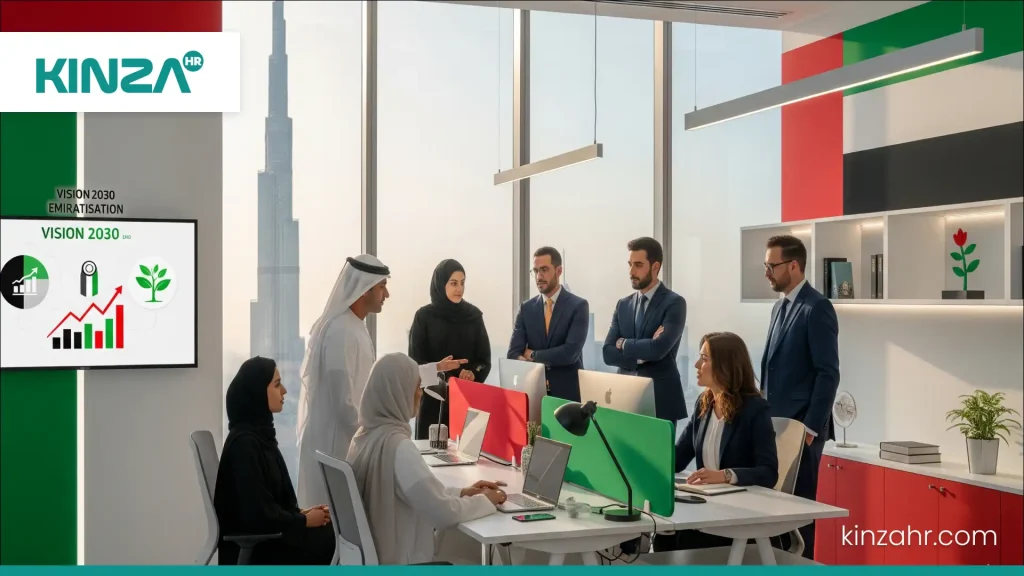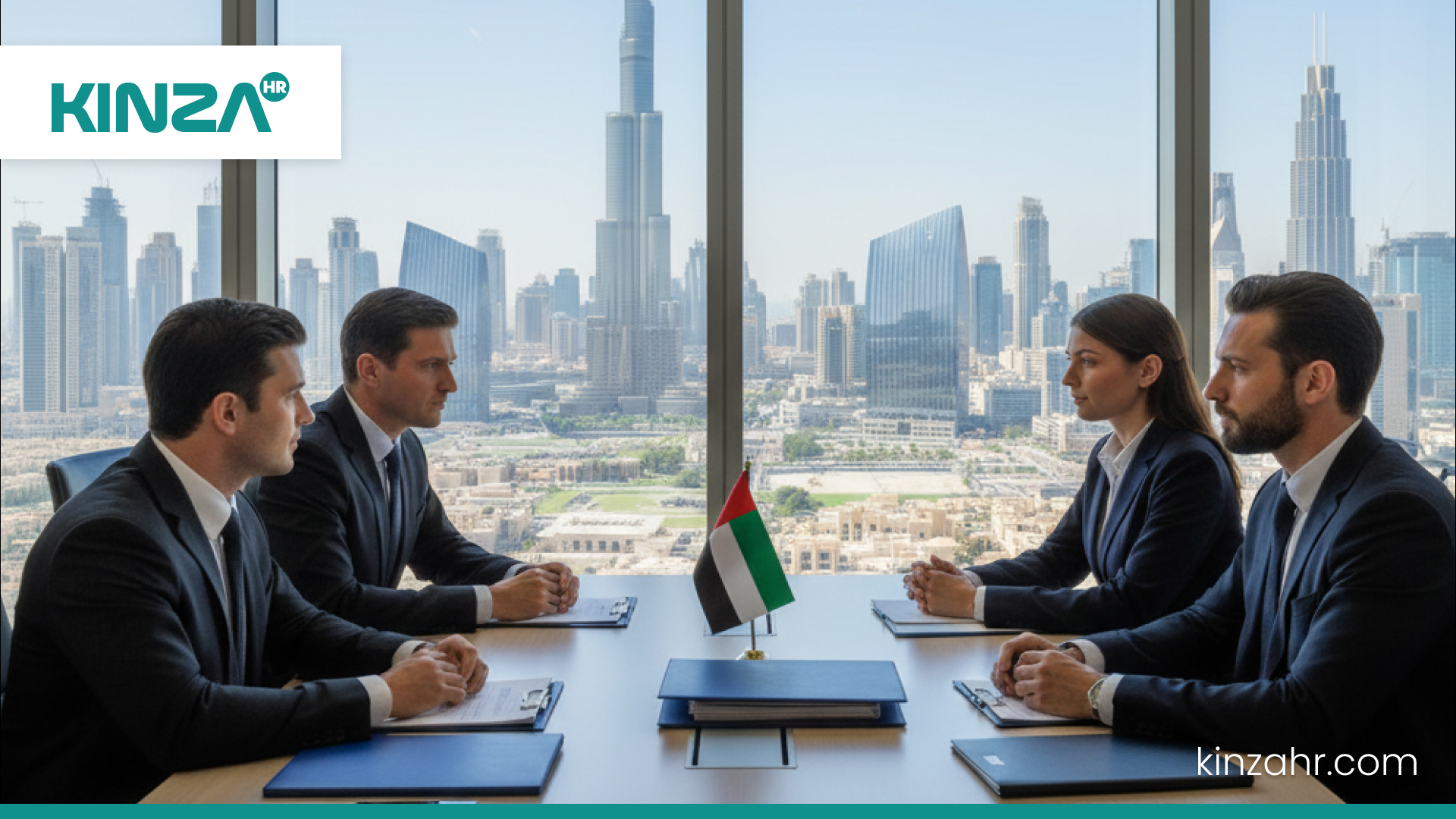The UAE has positioned itself being one of the most thriving countries in terms of economy, professional talent, and coming-of-age technology. Along with these modern improvements, the country understands the value of its Emiratis. They ensure their locals contribute to all sectors and industries, securing their rightful places based on their skills. This shift is known to be Emiratisation.
This program is a driving force that ultimately reshapes business operations and makes them ready for an advanced business future. The impact of Emiratisation turns out to be good, not only for the company itself but also for the stability of the country’s economy.
The organisations should take this policy as a strategic advantage instead of just a legal requirement. Embrace the competitive advantage and resilience by aligning with these national regulations. The earlier you adapt, the greater the benefits you will receive.
What Is Emiratisation?
Emiratisation is a UAE government policy introduced in the late 1990s. Especially covers the private sector, it aims for:
- Increase the participation of Emirati nationals in the workforce.
- Reduce reliance on expatriate labor and strengthen the local economy.
- Bridges legal compliance with economic strategy.
- Building a skilled national workforce while contributing to economic sustainability
All these factors contribute to the goals of Emiratisation, which come with specific targets and quotas based on industry and company size.
In short, Emiratisation is both a legal requirement and a strategic pathway for companies looking to align with the UAE’s growth ambitions.
The Government Introduced Quotas
The UAE sets Emiratisation targets that every company has to fulfill, regardless of its size and industry. For example:
| Company Size / Sector | Minimum Emirati Workforce % |
| 50+ employees (in general) | ~2% annually |
| Banking & Finance | ~4% annually |
| Insurance Sector | ~5% annually |
These quotas are designed to steadily grow local participation and are enforced through initiatives like Nafis.
More Focused-Sectors
Few industries are entitled to put more focus on following the Emiratisation target. These are:
- Technology, because of its constantly growing digital economy, needs
- Finance & Banking, because of its heavy regulation and customer-facing roles
- Construction, due to its roles in planning, compliance, and management
- Hospitality due to cultural representation and guest experience, representing globally.
Why Emiratisation is Important to UAE Businesses
Emiratisation works for the stability of the companies in the UAE in the long run. Businesses that actively participate in this policy tend to stay innovative and embrace continuous growth.
One of the goals of Emiratisation is striking a perfect balance between Emiratis and expatriates’ roles in shaping the workforce. Be it any industry, this approach supports national development. The significant decrease in reliance on foreign labour occurs.
Alignment with Vision 2030
Vision 2030 aims to diversify the UAE’s economy and build a skilled, competitive workforce. Companies that support Emiratisation contribute directly to this transformation while strengthening their local market presence.
Access to Incentives and Avoiding Penalties
Compliant businesses enjoy benefits such as;
- Reduced government fees
- Access to training grants
- Priority in public contracts.
Whereas Non-compliance can lead to substantial fines and restricted operations, making proactive adoption both a financial and strategic necessity.
Challenges Businesses Face Under Emiratisation
Businesses still often encounter practical hurdles in fulfilling quotas and meeting compliance. Prepare beforehand and understand these pitfalls to keep you stable in your journey.
Higher Salary Expectations
The wage expectations of many Emirati candidates rise when they are placed in any role. They ask for the package that aligns with market-competitive standards or government-backed guidelines.
To meet these expectations becomes challenging for both small and medium businesses while having to maintain their budget and profitability.
Cultural and Workplace Integration
Businesses are compelled to adapt to new rules or change their environmental policies. The multicultural workforce might require more effort and changed communication styles.
Talent Pool Limitations
Businesses often find it hard to fulfil roles based on their niches. Especially without extensive training and development investment, the pool is limited in choosing the best professionals from.
Administrative & Reporting Requirements
Complying with Emiratisation in UAE labour law involves;
- Detailed reporting
- Quota tracking
- Regular updates to authorities.
This can increase administrative workload, especially for companies new to these processes.
How Businesses Can Benefit from Emiratisation
Emiratisation offers companies a lasting competitive advantage. The returns to this investment go beyond just the regulatory benefits.
Government Support & Training Initiatives
The UAE government provides a range of support programs, from training grants to job-matching platforms. These resources help businesses upskill Emirati hires while reducing onboarding costs and timelines.
Building a Diverse & Inclusive Workforce
Curating your team with local as well as foreign talent, your workplace represents a culture-rich environment. Emiratis bring fresh perspectives and cultural insights to the table that strengthen your foundation with the country. It enhances your market value while building strong customer relations.
Improving National Brand Reputation
Customers and clients tend to trust such companies more that follow government-backed goals and targets. Prioritizing the national standards boosts credibility for the companies, whether it’s a newbie or a multinational entity.
Strategic Talent Planning
Emiratisation opens the door for the business to hunt the best leaders from the talent pool. These professionals create a strong team that sustains and fulfills the business’s long-term goals.
All of these benefits prove:
- Improved brand image
- Government partnerships
- Access to exceptional talent
Emiratisation vs. Traditional Hiring Models
Which one is more effective? This breakdown gives you a clear outlook of Emiratisation-based hiring and conventional recruitment:
Local vs. Expatriate Talent
| Aspect | Expatriate Talent | Emirati Talent |
| Contract Terms | Often fixed-term, mobility-driven | Permanent roles, stronger loyalty |
| Retention | Visa and opportunity-dependent | Development-focused |
| Expectations | Compensation and flexibility | Stability and growth |
Public vs. Private Sector Expectations
Emiratis used to prefer public-sector jobs due to benefits and job security.
Under Emiratisation, the private sector is adapting with competitive packages and work environments that rival public offerings.
These differences give prominence to hiring strategies. These can be adapted to fulfill both operational needs and regulatory goals..
Quota-Driven vs. Merit-Driven Hiring
Emiratisation introduces quota targets. Businesses must balance meeting these quotas with ensuring the right skills fit the role. Strategic planning helps avoid compromising on talent quality.
Whereas traditional hiring is merit-driven.
Most Suitable Operations for Emiratisation
Emirati employees thrive in roles that align with cultural context and strategic relevance.
Marketing & PR
National representation, cultural alignment, and local storytelling come alive when guided by Emirati professionals.
Customer-Relations Roles
Job functions like retail, banking, and client services benefit from Emirati cultural insight, improving engagement and brand resonance.
Administrative & Legal Functions
Emiratis bring stronger knowledge of labor law and government processes to HR and compliance-focused roles.
Final Word
There’s no deny in it that the impact of Emiratisation on UAE businesses is much more than just government-induced regulations. It is a strategic pathway that leads organisations in the private sector towards improved recruitment methods and hiring exceptional local talent. Weaving your workforce with the Emiratis, as per the standard quota, boosts your socioeconomic status.
Your market reputation gets improved, and you get to enjoy the endless incentives provided by the government. But sure, there are challenges like talent availability and cultural integration. However, with the right strategy and a plan, you will be able to innovate, adapt, and grow with the national standards.
Compliance is a critical element, but it can be taken care of by seasoned consultants like Kinza HR, who offer Emiratisation recruitment services. Not only do they make the entire process smoother, but they also guide you every step of the way.
Hence, emiratisation is a smart shortcut to dodge the competition and position your company as an industry leader while taking part in the UAE’s future economy.
FAQs
How is Emiratisation influencing private-sector hiring strategies across the UAE?
This program promotes local hiring in the private sector, filling roles with talented Emiratis. It boosts organisations to fulfill the target with strategic recruitment and follow retention practices.
What financial and operational challenges do businesses face under Emiratisation mandates?
While businesses enjoy many incentives that come with this program, they have to face setbacks, too, which are:
- Talent scarcity
- Elevated compensation
- Heavier administrative reporting burdens.
Which industries are most impacted by Emiratisation, and how can they adapt effectively?
Finance, tech, hospitality, and construction are the leading industries that face the strongest effects of this initiative. To stay ahead of the curve, they have to adapt to new practices. This can be targeted training, cultural integration programs, and recruitment strategies backed by Emiratisation.
What are the risks of non-compliance with Emiratisation quotas, and how can KinzaHR help mitigate them?
The companies that do not fulfill the hiring target face consequences of non-compliance. They might face fines while facing license issues, and reputational harm.
However, you can leverage the Emiratisation recruitment services of a consultant like KinzaHR. With their expertise. They ensure proper documentation while managing strategic hiring to meet quotas for you.
How can partnering with KinzaHR support businesses in turning Emiratisation into a competitive advantage?
KinzaHR transforms the Emiratisation impacts into an advantage for you. Connecting your business with trained Emirati talent, the team provides constant support during onboarding. Not only this, they strive to get your company aligned with Emiratisation and accomplish long-term growth goals.







